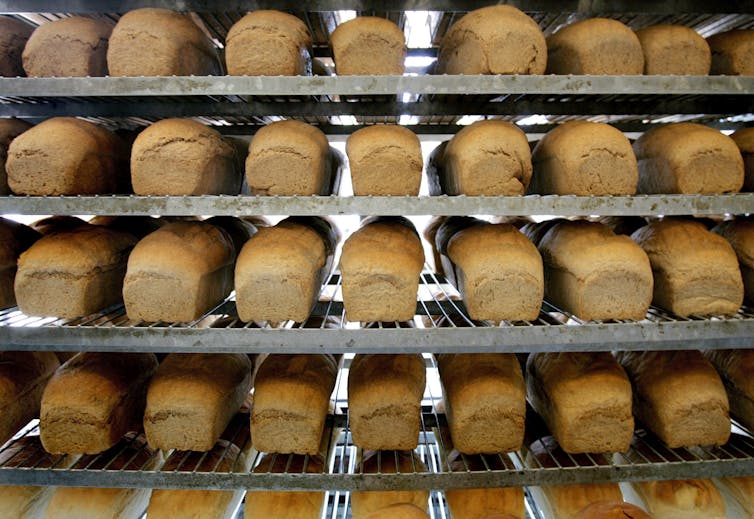The Puzzling Probe into Canada's Alleged Bread Cartel
/
A bread cartel is alive and well in Canada. Or is it?
Canada’s Competition Bureau is investigating major grocery chains for evidence of retail price fixing.
Loblaws, Sobeys, Metro, Wal-Mart and other companies have acknowledged the ongoing investigation. The outcome of the inquiry will likely not amount to much, but it does raise the question: Why is bread is being targeted by the bureau?
Demonstrating beyond a reasonable doubt that grocers are colluding to keep retail prices artificially high is almost impossible. Several attempts have been made in the past, with mixed results.
The average grocery store carries well over 30,000 different products, and prices can be affected by an array of factors: Commodity prices, energy and labour costs, new food safety and packaging regulations among them. These and others factors can all influence price points in many categories more or less simultaneously. An intentional collusion to falsely inflate profit margins would be hard to prove.
Historically, bread prices have been quite stable, with the exemption of 2008 and 2009, when prices jumped almost 50 per cent in a single year for all bakery products.
On the whole — unlike prices for fruits, vegetables and even meat products — bread has been immune to fluctuating prices for some time. In fact, Canadians have access to the most affordable food basket in the world.
Canadian food prices are relatively low
After the United States, Ireland and a few other countries like Singapore, Canadians spend less on food relative to their income than most countries in the world.
Nonetheless, since we live so close to the United States, where food quality is generally questionable but amazingly cheap, we often believe our own food prices are unfairly high. Prices are indeed higher here than in the United States, but much lower than in many places around the world.
In the last month alone, food retail prices have dropped in Canada, including bakery products. So, to suggest that food prices are inflated in Canada is somewhat far-fetched. And if Canadian consumers are paying too much for bread due to price-fixing schemes, the evidence isn’t readily apparent.
At the centre of this investigation, however, is a much deeper problem that lies in the food supply chain.
For years now, grocers have engaged in an open war with food processors, with grocers trying to position themselves as protectors of the public interest by pushing vendors to lower prices in order to remain competitive.
For the past few years, tensions between grocers and vendors have been at an all-time high. Major grocers have demanded price cuts from suppliers, causing a domino effect on the entire industry.
Small grocers complain
So, it’s not surprising to learn that independent grocers, through an industry association, passed along their concerns to the Competition Bureau. Consumers have barely noticed the conflict. Until now, that is.
Almost by design, the Competition Bureau may be trying to communicate to the market that grocers are on watch for squeezing processors.
As a food staple, bread is an appealing target. The bureau could have selected any food product, but bread’s status as a staple makes it an obvious choice — a clear majority of Canadians eat bakery products almost daily and, as a result, its price is an ongoing concern.

It was chosen for a reason: To make an otherwise dreary, obscure, supply-side issue more imperative to the daily lives of consumers.
Publicly traded companies extorting each other is less of a political or PR concern than allegations that grocers are allegedly gouging consumers. The investigation will likely not yield material results, but bread is clearly the best medium through which the bureau can send its message.
It’s not likely any grocer will be accused or arrested any time soon, but the Competition Bureau investigation could potentially restore peace within the food industry family.
Probe could bolster the food sector
A vibrant food sector is not possible without a strong food-processing sector, and making sure all make a decent profit within the food industry is difficult.
Nonetheless, consumers can only benefit if all sectors, from farm to table, succeed over time: we end up with a greater variety of decently priced, high-quality, innovative food products. Ultimately, and without sending anyone to prison, this investigation could strengthen the food sector.
Grocers know better than to engage in a doomed strategy of quotas and illegal price-setting activities. The mere spectre of a grocery cartel would not only be bad business, it threatens to tear up the social contract with the Canadian public that they adhere to every single day.
Consumers can expect to see deals being made within the industry in the days ahead.
![]() Food shoppers will almost certainly experience rebates in the bakery section as grocers rush to reassure their customers that a bread cartel in Canada is nothing more than a myth.
Food shoppers will almost certainly experience rebates in the bakery section as grocers rush to reassure their customers that a bread cartel in Canada is nothing more than a myth.
Sylvain Charlebois, Professor in Food Distribution and Policy, Dalhousie University
This article was originally published on The Conversation. Read the original article.



![Retail-insider-NRIG-banner-300-x-300-V01-3[2].jpg](https://images.squarespace-cdn.com/content/v1/529fc0c0e4b088b079c3fb6d/1593476525034-QRWBY8JUPUYFUKJD2X9Z/Retail-insider-NRIG-banner-300-x-300-V01-3%5B2%5D.jpg)
![Retail-insider-NRIG-banner-300-x-300-V01-2[2].jpg](https://images.squarespace-cdn.com/content/v1/529fc0c0e4b088b079c3fb6d/1593476491497-W6OZKVGCJATXESC9EZ0O/Retail-insider-NRIG-banner-300-x-300-V01-2%5B2%5D.jpg)
![Retail-insider-NRIG-banner-300-x-300-V01-4[2].jpg](https://images.squarespace-cdn.com/content/v1/529fc0c0e4b088b079c3fb6d/1593476508900-TJG5SNQ294YNOCK6X8OW/Retail-insider-NRIG-banner-300-x-300-V01-4%5B2%5D.jpg)